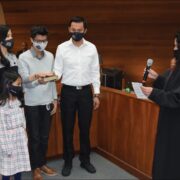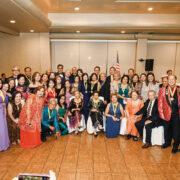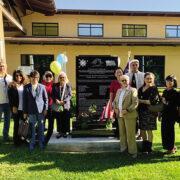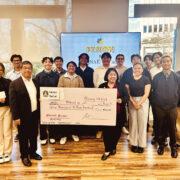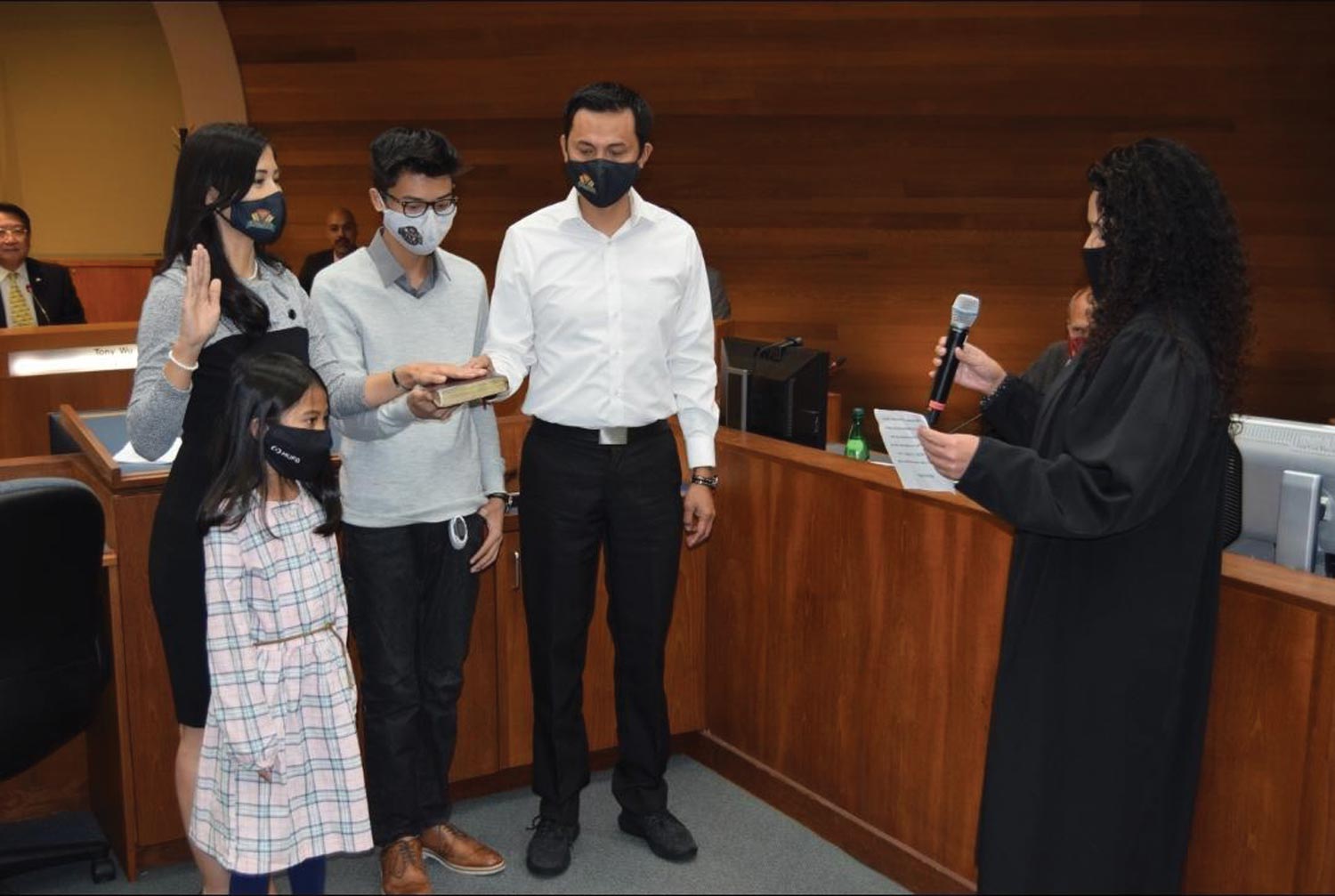
WEST Covina, long considered home to one of the largest Filipino American concentrations in Southern California, now has its first Filipina-Mexican American mayor.
Leticia “Letty” Lopez-Viado, who previously served as mayor pro tem, will lead the San Gabriel Valley city in the top post for the next year.
The incoming mayor was sworn into office by Judge Lucy Armendariz of the Los Angeles Superior Court, with her husband Garry Viado and their two children Victoria and Garrett at her side, during a ceremony at the West Covina council chambers on Tuesday night, December 15.
“I feel extremely honored and proud. It’s nice to see that I can take on a leadership role and give inspiration to others who have been in situations like mine in the past. West Covina is a diverse city with high populations of Filipinos and Hispanics,” Lopez-Viado told the Asian Journal in an interview.
West Covina, located about 19 miles east of Downtown Los Angeles, boasts a population of 107,786 residents, according to the U.S. Census Bureau. About 11,000 Filipino Americans have settled in the city.
Lopez-Viado — whose mother hails from Manila and her late father from Mexico — was elected to the City Council in 2018, becoming its first councilmember of Filipina and Mexican descent. She ran touting her nearly two decades of experience working in Los Angeles County’s public sector.
By day, she is a senior recreation director with the city of LA’s Department of Recreation and Parks, where she manages an all-around sports program.
“I’ve worked with different types of cultures and economic backgrounds on both extremes. These experiences have made me stronger and see what’s needed. My family, upbringing [and] the places I’ve worked all combine and come into how I work for the community,” she said.
Prior to being councilmember, she was involved with the local government as a community and senior services commissioner, and as a member of the Friends of West Covina Library, which supports literacy programs.
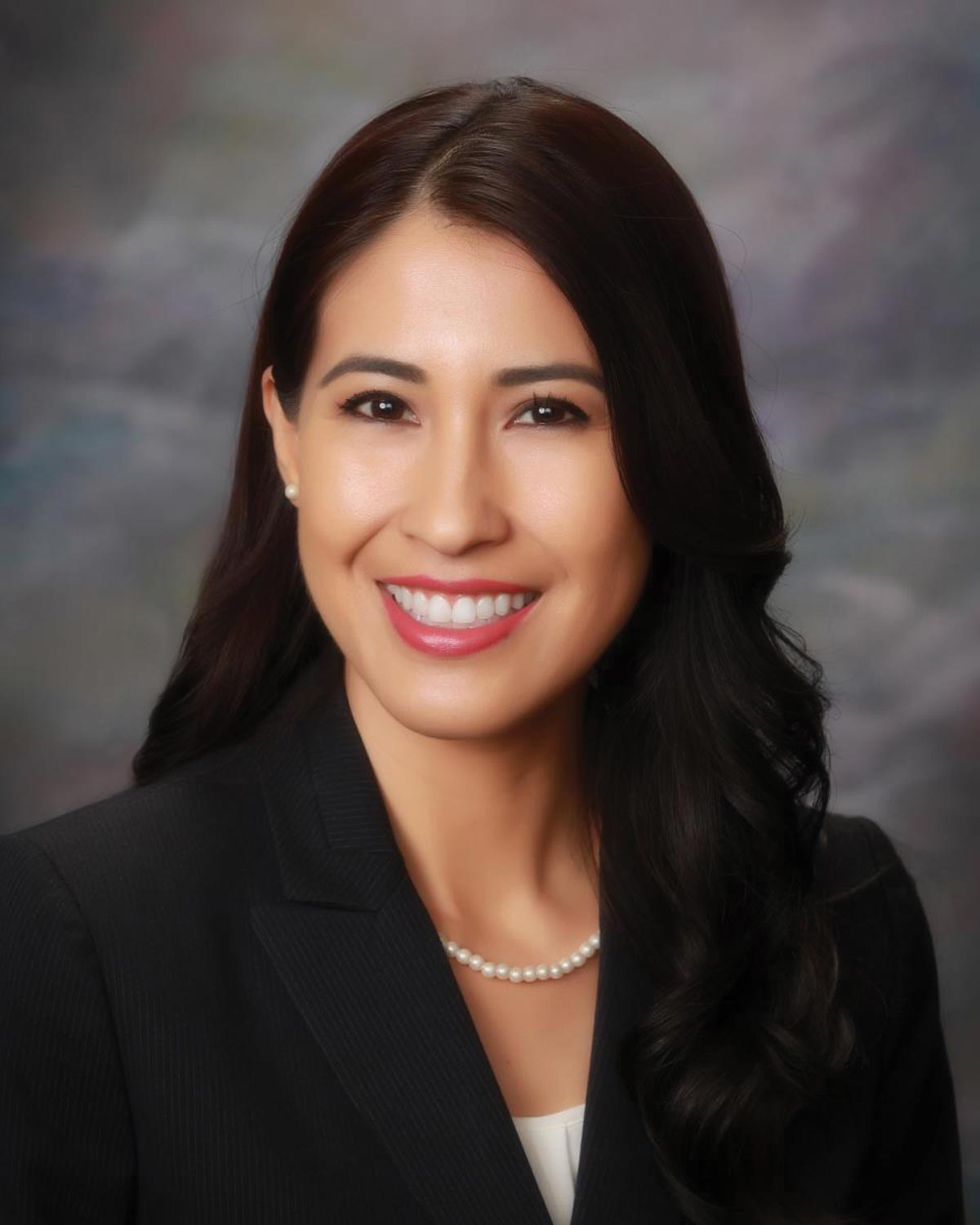
West Covina City Council
Lopez-Viado’s goals for the council include improving the quality of life of West Covina residents through clean and safe parks, public safety resources, and controlling spending. As the pandemic continues into the next year, the council under her leadership will focus on the local recovery efforts.
“I’m hoping to rebuild and improve our city and community and give them faith and hope that everything’s going to be okay,” she said. “We don’t know when the pandemic will end, but as soon as it does, we will work to reopen our city and businesses and bring community events that people have been missing.”
She also seeks to maintain the “business friendly” environment within West Covina, which has around 4,000 small businesses, according to several estimates. With the holiday season, she’s encouraging residents to shop local and help keep them open.
“We’re not going to be too hard on our businesses. LA County has rules, which we will follow. But in terms of hard enforcement, I don’t want to use our resources because we have very little police offices and we want to make sure the city is safe,” Lopez-Viado said.
Along Amar Road alone, two shopping plazas across the street from one another bear two major Filipino American supermarkets and over a dozen small businesses like restaurants, hair salons and repair shops. Fil-Am community members have long been pushing for the area to be designated as a “Little Manila.”
Last year, Jollibee moved its North American headquarters along North Barranca Street, with the company’s iconic bee logo visible atop the 13-story building along the I-10 freeway.
When LA County and then the state of California moved to close outdoor dining, Lopez-Viado and other councilmembers challenged the orders, saying in a letter that there is a lack of sufficient data correlating COVID-19 transmission with dining out and “no discussion of the impacts on people’s livelihood.”
As of this writing, Southern California is under a regional stay-at-home order, which has closed certain sectors from personal care services and family entertainment centers, and has limited restaurants to take out and delivery, and placed occupancy limits on retail stores.
Earlier this month, outgoing Mayor Tony Wu introduced the idea of West Covina having its own health department separate from the LA County Public Health umbrella, similar to the cities of Pasadena and Long Beach. This is something Lopez-Viado said she would continue to explore.
“We want to work with LA County but also take a load off. So if we can work with our hospitals and medical industry, we can focus on local control of what is occurring here because it’s not a one-size-fits-all,” she said. “Something that’s occurring in another city or another region doesn’t necessarily mean that it’s going to be the same in our city.”
Though families are encouraged to stay home as much as possible, Lopez-Viado reminds them that going out for walks and getting fresh air at a local park can boost mental and physical health at this time.
Along with Lopez-Viado, other Fil-Ams leading Southern California cities, as previously reported by the Asian Journal include: San Diego Mayor Todd Gloria, Sierra Madre Mayor Rachelle Arizmendi, and Artesia Mayor Pro Tem Melissa Ramoso.


